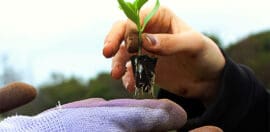A three step guide to decolonising philanthropy

11 May 2021 at 8:30 am
“Decolonising wealth is really about sharing wealth and creating a future where we can all mutually thrive.”
As Australia undergoes a reckoning of its colonial origins, philanthropy and all the power that comes with the practice is being put under the spotlight.
US-based philanthropic activist, Edgar Villanueva, is at the forefront of the movement to decolonise philanthropy not only in his home country but across the world.
Following his keynote address at Philanthropy Australia’s 2021 National Conference, Villanueva told Pro Bono News that he is aiming to spark conversations around the lack of diversity in Australian philanthropic organisations, and the small percentage of grant dollars going towards Indigenous communities and people of colour.
He said that in order to decolonise philanthropy, organisations and individuals had to ask themselves three questions around where philanthropic wealth comes from, who’s in charge of distributing wealth, and what the data shows.
“Understanding the origins of money isn’t just about tracing back to the family… but the policies and the systems that have been in place to allow certain folks to be able to accumulate wealth in the first place,” Villanueva said.
He said that the people in charge of giving away money were generally detached from the problems philanthropy was trying to fix, and that needed to change.
“It’s important to begin to think about how we diversify not just the staff of organisations, but also at the trustee level, so that the people directly impacted by the issues we care about are making decisions about where funding goes,” he said.
Read more: We need to talk about racism in philanthropy
And he said that collecting data was an important way for organisations to remain accountable.
“Collect data on where your funding is going and who benefits from it and what you’ll see is that most funding is going to large, white-led organisations,” he said.
“It’s important that we actually track that so we can set goals like giving 10 per cent of our funding to communities of colour.”
Villanueva said that we were living through a time where the world was waking up to deeper issues around race and power, and it was important philanthropy stepped up to the challenge.
“This is a fantastic moment for philanthropy to take a step forward and provide leadership around those conversations, not to shy away from it, but to actually create spaces, and to really think about and appreciate Indigenous leadership in a way that we haven’t in the past,” he said.
Providing an alternative view
As well as delivering the keynote speech at the conference, Villanueva also participated in a panel discussion on the actions philanthropy can consider and adopt to move towards decolonisation.
He was joined byJody Barney, chair of KWT; Kathryn Coff, from the Fellowship for Indigenous Leadership; and Shaun Middlebrook, the CEO of Woor-Dungin – three First Nations people with experience of philanthropy as trustees, workers or recipients.
During the panel, Coff said that giving power to Aboriginal and Torres Strait Islander communities to solve social and environmental problems would see a completely different approach to the world of giving and impact.
“We see the world differently,” Coff said.
“I would say we are probably the best people to manage money because we have so much trust, we talk with communities, and we do things for the greater good and sustainable succession.”
Middlebrook also noted that if philanthropists wanted to see real outcomes, Aboriginal and Torres Strait Islander people needed to be the ones managing their financial decisions.
“We know where the money needs to go, we understand our communities… we have a history of management, no matter how difficult it is,” Middlebrook said.
“Funding for Aboriginal communities that is short and sharp isn’t going to support better outcomes for communities.”
Wealth for all
Villanueva said that if philanthropic organisations and individuals did decolonise their practices, the world would be a different place.
“Decolonising wealth is really about sharing wealth and creating a future where we can all mutually thrive,” he said.
As for whether any of this was actually possible, he said he remains positive and hopeful.
“There have been tremendous steps that philanthropic organisations have made recently, such as a foundation in Minneapolis that committed $100 million to Black and Indigenous people in their region,” he said.
“Even the fact that we are having these conversations at the Philanthropy Australia Conference is a great start.
“I’m inspired and hopeful, I do believe the best in people and I do believe change is possible.”







